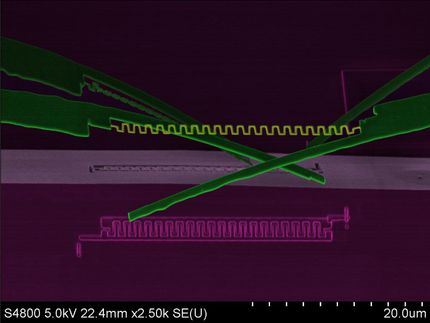Cornell receives New York state funds to develop ultra-small, implantable sensors
Physicians may someday monitor a patient's blood flow, blood pressure and temperature with tiny, implantable devices -- some small enough to be injected into a person's vascular system, thanks to research by a Cornell University professor and an Ithaca-area high-tech firm.
Such tiny, implanted sensors could provide separate readings for particular organs in a patient or be unobtrusively implanted in patients whose systems need constant monitoring, said Edwin Kan, associate professor of electrical and computer engineering at Cornell, who works on developing these devices at the Cornell NanoScale Science and Technology Facility.
His research recently received a boost of $255,000 from the New York State Office of Science, Technology and Academic Research (NYSTAR). The agency's grants are designed to assist academic research institutions and businesses in their efforts to bring high-tech innovations from the laboratory to the marketplace.
"The product is aimed to enhance the surgical tools used today," said Kan, who is working with Transonic Systems, which already produces miniature devices for measuring blood flow in animals and human patients and is contributing significant staff time and funds to this research effort. "So one day, surgical monitoring equipment will be in the form of microscopic implants or integrated with present tools."
Kan noted that these miniature sensors can be as small as 100 microns in length or width, with the potential to be as small as several microns in the future. To give that size some perspective, the average human hair ranges from 40 to 120 microns in diameter.
Other news from the department science

Get the analytics and lab tech industry in your inbox
By submitting this form you agree that LUMITOS AG will send you the newsletter(s) selected above by email. Your data will not be passed on to third parties. Your data will be stored and processed in accordance with our data protection regulations. LUMITOS may contact you by email for the purpose of advertising or market and opinion surveys. You can revoke your consent at any time without giving reasons to LUMITOS AG, Ernst-Augustin-Str. 2, 12489 Berlin, Germany or by e-mail at revoke@lumitos.com with effect for the future. In addition, each email contains a link to unsubscribe from the corresponding newsletter.





















































